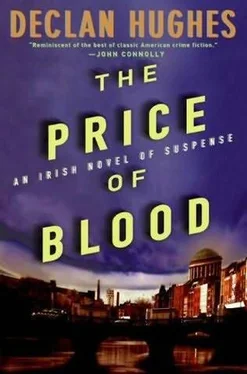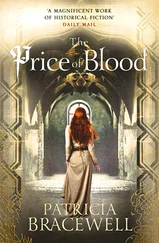
Declan Hughes
The Price of Blood
The third book in the Ed Loy series, 2008
An Irish Novel of Suspense
Depend on the rabbit's foot if you like,
but remember, it didn't work for the rabbit.
– R. E. Shay
The Turf, and long may we be above it.
– Jorrocks' Toast
Three weeks before Christmas, Father Vincent Tyrrell asked Tommy Owens to fill in for George Costello, who had been the sacristan at the Church of the Immaculate Conception in Bayview for thirty years until he was rushed to the hospital with inoperable stomach cancer. A lot of Father Tyrrell's parishioners were outraged, to put it mildly, since Tommy was known as a dopehead and a malingerer and a small-time drug dealer, one of the die-hard crew who still drank in Hennessy's bar, and not a retired Holy Joe shuffling about the church in desert boots and an acrylic zip-up cardigan like George Costello, God have mercy on him. And fair enough, the first time I saw Tommy on the altar in cassock and surplice, it was a bit like something out of a Buñuel film.
But what a lot of his parishioners didn't know was that Tommy had been one of Father Tyrrell's most devout altar boys until he was eleven, when the sacrament of confirmation had the unintended reverse effect of enfeebling his faith entirely, or that since Tommy's mother had dropped dead of a stroke a month ago, Tommy had been haunting the church, the only soul under seventy at ten mass every morning. Now he was standing by to clear the altar after eleven-thirty mass on the last Sunday in Advent as I stood and made the best fist I could of rejoicing with the rest of the congregation about Emmanuel's imminent arrival.
O come, thou Dayspring, come and cheer
Our spirits by thine advent here;
Disperse the gloomy clouds of night,
And death's dark shadows put to flight.
The altar cloths and hangings were purple; the tree was decorated and the great crib was installed in a side altar; the fourth candle on the wreath had been lit. Christmas hadn't meant much to me in a long while, never mind Emmanuel, but I had always liked Advent, the way the anticipation was so intense it could make you clean forget the inevitable letdown in store, just like a bottle, or a woman. Although when a priest sends for a private detective the day before Christmas Eve, the distinction between anticipation and letdown tends to blur; the only thing you can properly be prepared for is the worst.
Looking at Tommy, now he had stowed his vestments in the sacristy, I wondered if those graying parishioners streaming past me with their damp winter coats and their filmy eyes and their scent of lavender and pan stick and dust had revised their opinion of him; certainly he was a far cry from the goateed, straggle-haired ne'er-do-well of just a few months ago. The haircut and beardless chin came from the Howard case he had worked with me (a case he was in no small way the cause of; a case in which, not incidentally, he saved my life), but the rest of it-the multicolored acrylic jumper that was not a zip-up cardigan but may as well have been, the relaxed-fit cords, the soft-soled shoes-was close enough to George Costello to reassure even the most doctrinaire old biddy of the strength of his devotion. And of course, Tommy dragging his ruined foot-the result of a stomping from George Halligan for stealing his brother Leo's bike back when we were kids-surely completed the picture of harmless piety. To my eyes, it looked like nothing but the antic shades of mourning, the haphazard motley of confusion and grief.
Tommy came down the aisle toward me; I stood out from the pew and genuflected; he turned and I trailed after him to the altar, where there was another genuflection from us both, old enough to have had it bred into our bones. For all the Godless years I worked in L.A., people found it strange that I could never break the habit of crossing myself when I passed a hearse, or heard the tolling of a church bell. I still can't. I stepped up onto the altar to make for the sacristy, but Tommy turned left and exited through the side door. I followed out into the bright, cold morning and Tommy led me down a path to the rear of the churchyard. We stopped at a low metal gate beneath a row of bare sycamore and horse chestnut trees glistening with frost and Tommy, still determinedly avoiding my eyes, pointed over it to a redbrick Victorian villa fifty yards away.
"I know where the presbytery is, Tommy," I said. "Sure didn't we once have thirty sacks of pony nuts and four dozen bales of hay sent there, for the crack?"
"And Father Tyrrell knew it was us," Tommy said. "Down to the school the next day with him."
"He knew it was you," I said. "You know why? Because you gave the deliveryman your real name."
"I didn't," Tommy said. "I said Timmy Owens, not Tommy."
"Yeah. A mystery how he caught on to us, really."
"I never gave you up, Ed."
"You didn't need to, sure everyone knew we hunted as a pair. Jasus, the clatter he gave us."
"He went easy on you. They always did. They knew deep down you were a good boy. You were just easily led, that's all, by tramps the like of me."
I laughed at that, my breath pluming in the crisp air, and Tommy's face creased into something like a grin. It was the longest conversation we'd had since the funeral.
"How're you making out with this sacristan thing, Tommy?" I said, half fearing he'd say something like "'Tis a great comfort," or "Sure 'tis the will of God," in reply.
Tommy grimaced, looked over his shoulder at the last of the 'oul ones straggling out of the church, shrugged and lit a cigarette.
"It's not exactly me, is it?" he said. We both laughed at that, furtive, back-of-the-class laughter in the chill noon sunlight.
"But yeah, it's keeping me out of trouble. Out of the house. I can't face the whole, all her clothes, her paintings, the whole gaff just reminds me of her. Feels like it's haunted. You know what I mean, Ed."
I nodded. I had come back from L.A. to bury my mother, and stayed to find out what had happened to my father, who had disappeared twenty years earlier. Now I was living in the house I grew up in; living and partly living. There were days it seemed more like all I was doing was dying there: the souls of the dead hovered in the rooms like smoke, until I thought I might suffocate. I spent the time I wasn't working in one pub or another, stumbling home when I could be sure I would fall asleep straightaway, and then leaving the house first thing the next morning and starting all over again. If I wasn't thirsty, I spent time in churches, too: they were warm and quiet, and no one thought you were unwelcome there, or at least no one made you feel as if you were. I knew what Tommy meant all right.
"And Father Tyrrell's a bollocks, this we know, but he's on the level, he doesn't expect you to pray with him or pretend to be a Holy Joe or anything. And he has the inside on the ponies, of course. I'm making a mint on the tips he's giving me, and Leopardstown comin' up."
I had three beaten dockets in the pockets of my coat, and more on the floor of my car, and the opposite of a mint in the bank, but before I could ask Tommy to share a few of those tips, or to explain why a Catholic priest should "of course" know so much about horse racing, the dark-clad figure of Father Vincent Tyrrell appeared in the doorway of the presbytery, a cigarette in his hand, the smoke coiling in a wreath above his head. Tommy held a hand up to the priest and bowed his head and stood aside as if he was presenting me at court, and I thought I saw a flicker in his face and something cross his eyes: not fear, nor hatred; maybe just the lingering ghost of both. Whatever it was, he dispelled it with a wink in my direction and a grin that didn't reach his eyes and hauled himself back toward the church.
Читать дальше













